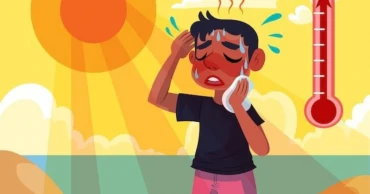Child Care
How to Keep Your Baby Comfortable and Healthy While Using Air Conditioner or Cooler
In Bangladesh's hot weather, air conditioners (ACs) and coolers often become necessities to beat the heat. However, as a parent, ensuring your baby’s comfort and wellbeing in such environments can be tricky. Babies are more sensitive to temperature changes, and without proper care, they might catch a cold. So, how do you balance the need for cooling while keeping your baby healthy?
Why Babies Catch Cold Under ACs
Babies Have Weaker Immune Systems
Babies, especially newborns, have developing immune systems. This means they are more susceptible to catching colds and infections, which can be triggered by their surrounding ambients, such as exposure to cold air from ACs.
Rapid Temperature Changes
One key reason babies catch cold under ACs is the rapid shift from warm to cool temperatures. Imagine stepping out of a hot, humid day into a chilled room—you will feel the difference immediately. For babies, such abrupt changes in temperature can hurt their respiratory system, making them more prone to colds and related illnesses.
Read more: How to comfortably travel with babies
Dry Air in AC Rooms
ACs tend to remove moisture from the air and make the room dry. Babies’ nasal passages can get dried out, making them more vulnerable to respiratory issues and colds. They may also experience dry skin, which can lead to discomfort.
Babies' Inability to Regulate Body Temperature
Unlike adults, babies cannot regulate their body temperature effectively. This means they might feel colder or warmer than you do under the same conditions. Though a room’s temperature might seem comfy for grown-up children and adults, it can be too cold for a baby, increasing risk of catching a cold.
1 year ago
How Play Helps Children's Development: A Comprehensive Guide to Benefits
Play is not just a fun pastime for kids; it is essential for their overall development. Through play, children explore the world around them, experiment with ideas, and build crucial skills that will set them up for success in life. This comprehensive guide delves into the multifaceted benefits of play for a child's cognitive, emotional, social, and physical development.
Cognitive Development
Enhancing Creativity
Play stimulates a child's imagination, allowing them to explore new ideas and scenarios. Activities like building with blocks or creating stories foster creativity by encouraging problem-solving and critical thinking.
In this way, young children develop social skills, learn to express emotions, and build confidence. These experiences provide a safe space for experimenting and learning, laying the foundation for innovative thinking and cognitive growth throughout their lives.
Problem-Solving Skills
Through play, kids encounter challenges that require problem-solving. Engaging with puzzles, board games, and make-believe scenarios helps develop their critical thinking skills and ability to find solutions.
Read more: How to Teach Students to Accept and Overcome Academic Failures
These activities also teach patience, persistence, and adaptability. Additionally, play enhances memory and cognitive flexibility, allowing children to approach problems from various angles. This hands-on learning prepares them for real-life situations, fostering resilience and a proactive mindset.
Language Development
Engaging in play, especially with peers, encourages young children to communicate effectively. They learn new words, sentence structures, and conversational skills, enhancing their language abilities. Play also teaches kids to listen, share ideas, and negotiate, which are crucial for social interaction.
Through storytelling, role-playing, and collaborative games, a child can expand their vocabulary and understanding of language nuances, building a strong foundation for future communication and literacy skills.
Boosting Memory and Attention Span
Games that require concentration and recall, such as memory cards, help improve a child's memory and attention span. These activities challenge young children to remember patterns, sequences, or instructions, thereby enhancing their cognitive abilities.
Read more: Sibling Bullying and Abuse: Reasons, Types, Signs and Prevention
Engaging in such games, kids learn to focus for extended periods, sharpen their observation skills, and develop strategies for retention. This mental exercise supports academic learning and promotes effective learning habits and problem-solving skills.
1 year ago
Summer Tips for School-going Children
As the summer heatwave continues, the risk of heat exhaustion and dehydration becomes a concern. Like adults, children can suffer from severe heat-related illnesses. Therefore, parents and caregivers should be cautious, especially for school-going children who stay outside the home for hours. Here are some essential summer tips to ensure the well-being of school-going children during the hot months.
How to Keep School-going Children Healthy During Summer Heat Waves
Stay Hydrated
Ensuring children stay hydrated is crucial during a heatwave. Parents and caregivers should encourage children to drink plenty of fluids throughout the day, focusing on water as the primary source of hydration. It would be wise to avoid serving children sugary or caffeinated beverages that can contribute to dehydration.
While leaving for school, it is necessary to provide children water bottles and remind them to take regular sips, even if they are not feeling thirsty. Offer water-rich fruits and vegetables like watermelon, cucumber, and oranges as healthy snacks to help keep children hydrated.
Read more: How to Protect Outdoor Workers from Heat Stroke
Dress Appropriately
Lightweight, loose-fitting clothing of breathable fabrics like cotton or linen can help children stay cool. It is highly recommended to opt for light-coloured clothes that reflect sunlight rather than dark colours that absorb heat.
Furthermore, while staying outdoors children can wear wide-brimmed hats and sunglasses to protect their faces and eyes from the sun's harmful rays.
Seek Shade
Children might need to stay outdoors for diverse purposes, like waiting for a school bus. During such situations, children should be encouraged to seek shade or canopies to minimise direct exposure to the sun.
Read more: How to Protect Your Skin and Hair from Sun Damage
Apply Sunscreen Liberally
Sunscreen application is another crucial aspect of sun protection. Like adults, children can use broad-spectrum sunscreen with a high SPF (Sun Protection Factor) of at least 30. Before going to school or other places, kids need to apply sunscreens generously to their exposed skin, including the face, neck, arms, and legs. Nowadays many reputed brands produce child-friendly sunscreen products.
Sunscreen should be reapplied every two hours, or more frequently if children are swimming or sweating heavily. Parents and caregivers should teach children how to apply sunscreen properly and encourage them to build their sun protection routine.
Plan Outdoor Activities Wisely
While planning schedules for active outdoor games and sports during the warmer months, parents should pay attention to the matter that children stay safe from overheating or sunburn. However, when planning outdoor activities, it's essential to schedule them during the cooler parts of the day, such as early morning or late afternoon, to avoid the peak heat hours.
Read more: Summer Drinks: Refreshing Homemade Sherbets to Beat the Heat
Caregivers should guide children to play in shaded areas, such as parks with plenty of trees, or bring portable shade structures like pop-up tents or sun umbrellas to prevent sunburn and heat-related illnesses.
While playing, sweat should be wiped off immediately. Additionally, encouraging regular play breaks in shaded areas allows children to rest and hydrate. It is essential to prevent heat-related illnesses.
Stay Indoors During Peak Heat
During extreme heat, it is best to stay indoors in air-conditioned or well-ventilated spaces for children to avoid heat-related illnesses. It would be thoughtful for the parents and caregivers to plan indoor activities like board games, arts and crafts, or movie marathons to keep children entertained and safe from the heat.
Read more: Beat Dehydration with These Summer Vegetables
Educate About Heat-Related Illnesses
It is essential to teach children about the signs and symptoms of heat-related illnesses, such as heat exhaustion, heatstroke, dizziness, nausea, rapid heartbeat, etc.
Parents and caregivers should teach children to speak up if they are feeling unwell and remind them of the importance of seeking help from a trusted adult if they experience any symptoms of heat-related illness.
Use Cooling Strategies
Implementing cooling strategies like taking cool showers or baths, using fans or air conditioning, and applying cold compresses to the skin can help children beat the heat and stay comfortable indoors.
Read more: Heat Stroke Prevention: Best foods, drinks to avoid heat exhaustion
Parents and caregivers can freeze damp washcloths or water bottles and place them on pulse points like the wrists, neck, and temples to help lower the body temperature of the children. It can make their mind and body cool after returning home from school or outdoors during the heat waves.
Regular Baths
Bathing plays a vital role in maintaining cleanliness. It is important to avoid allowing children to drink or bathe in ice-cold water during hot weather. Instead, offer them water at room temperature or slightly cool.
When bathing, use water at a comfortable temperature, neither too hot nor too cold, to avoid shocking their system.
Read more: Heat Stroke: Symptoms, First Aid, and Prevention
Stay Connected
Staying connected with children, caregivers, and school staff during a heatwave is essential for assuring everyone's safety. Keep lines of communication open with children, caregivers, and school staff during summer.
Sharing information about heat safety tips and encouraging everyone to look out for each other helps create a supportive environment where everyone can stay cool, hydrated, and healthy during hot weather.
Thus, parents and caregivers can minimise the risk of heat-related illnesses in children at home, community space, school, playground, or other places.
Read more: Guidelines issued for primary schools reopening tomorrow amid heatwave
Bottom Lines
Implementing summer safety for school-going children during a heatwave is paramount to their well-being and health. Parents, caregivers, and school staff can help mitigate the risks associated with hot weather, by prioritising hydration, sun protection, appropriate clothing, and staying cool indoors during peak heat hours.
Educating children about heat-related illnesses and empowering them to recognise signs of distress is equally important. By working together and staying aware, the wellbeing and health safety of school children can be assured during the summer months.
Read more: Mist Fan Buyer Guide and Price Ranges in Bangladesh for 2024
1 year ago
Sibling Bullying and Abuse: Reasons, Types, Signs and Prevention
Bullying is a major concern that spans age and settings, sparing no space from its reach. Usually, bullying is connected with school and online spaces. We often forget other bullying behaviors like sibling bullying and abuse. In this article, we will explore the causes behind sibling bullying, its diverse forms, red flags to pay attention to, and most importantly, effective strategies for parents to both avert and tackle such conduct.
Common Reasons for Sibling Bullying and Abuse
- Jealousy and competition
- Power imbalance
- Modeling behavior
- Lack of communication skills
- Copying parental behavior
- Seeking attention
- Personal insecurities
- Unresolved conflicts
- External stressors.
Read more: Bullying in School: How to Protect Children and Deal with the Issue
Types of Sibling Bullying and Abuse
Physical Bullying
Physical bullying entails employing force or aggression to intimidate or cause harm to a sibling. This can include hitting, pushing, kicking, or any other physical actions intended to exert control or cause physical pain.
Psychological Bullying
Psychological bullying is a subtle yet damaging form of abuse where one sibling manipulates another's emotions, self-esteem, and perceptions. This can involve tactics like spreading rumors, exclusion, and using psychological pressure to gain control or dominance.
Sexual Bullying
Sexual bullying involves inappropriate and coercive behaviors of a sexual nature between siblings. This can encompass unwanted advances, comments, or actions that create a hostile environment, causing emotional distress and violating personal boundaries.
Read more: How to Raise a Caring, Empathetic and Compassionate Child
Symptoms of Sibling Bullying and Abuse
- Unexplained marks or bruises
- Frequent feelings of unease
- Marks from self-harm or expressing thoughts of self-harm
- Decline in school performance
- Fear or anxiety around a particular sibling
- Rapid fluctuations due to stress
- Refusal to be alone with the sibling
- Low self-esteem
- Running away from home
- Sleep disturbances or changes in sleep patterns
- Inappropriate sexual behavior.
Read more: Common Sleep Problems in Children: Causes, Symptoms, Ways to Help
Effects of Sibling Bullying and Abuse on Children’s Mental Health
- Diminished confidence and self-worth
- Triggering depression
- Anxiety due to fear
- Social isolation
- Trust issues
- Internalized aggression
- Decline in concentration and grades
- Potential engagement in self-destructive behavior
- Eating disorders
- Effects can extend into adulthood.
Read more: 15 Gift Ideas for a Newborn Baby
How Parents can Protect Children from Sibling Bullying and Abuse
Set Clear Boundaries
Try to establish firm rules that unequivocally condemn any form of aggressive behavior or bullying between siblings. Communicate consequences for crossing these boundaries, reinforcing the importance of respect and kindness.
Positive Reinforcement
Parents should acknowledge and reward instances of respectful interactions and cooperation between siblings. This encourages a culture of kindness and reinforces the benefits of treating each other with respect.
Model Respectful Behavior
It is important to demonstrate kindness, empathy, and respectful communication in parents' interactions with others, including their children. Children often learn by example, and seeing respectful behavior from adults sets a powerful precedent for sibling interactions.
Read more: How physical punishment affects children and alternative ways to discipline them
Individual Attention
Parents should spend quality time with each child. This helps build strong bonds and reduces feelings of rivalry. It also fosters a sense of belonging, decreasing the likelihood of resorting to bullying for attention.
2 years ago
Summer Heatwave: Here’s How to Keep Children Safe
The summer heat can be excruciating, with soaring temperatures that are amplified by the impact of global warming. When the mercury rises, like the adults, children often suffer different health issues. Let’s find out how parents can keep their children safe from heat-related illness.
Heat-related Illness: Heatstroke vs Heat Exhaustion
Heatstroke
Heatstroke is a life-threatening condition caused by a malfunction in the body's temperature regulation system. Often it happens due to exposure to high temperatures or intense physical exertion in hot weather.
Heat Exhaustion
Heat exhaustion is a milder heat-related illness resulting from prolonged heat exposure and insufficient fluid intake. It occurs when the body becomes dehydrated and loses electrolytes through excessive sweating. Without proper treatment, it can cause heatstroke.
Read more: Class 7 student dies of heat stroke, 5 fall sick in Khulna
Causes of Heatstroke and Heat Exhaustion in Children
Immature Thermoregulatory System
Young children have a less developed ability to regulate their body temperature compared to adults. Their sweat glands may not function as efficiently, making it more challenging for them to cool down effectively in hot environments.
Increased Surface Area to Body Weight Ratio
Usually, children have larger surface areas relative to their body weight, which means they can absorb heat from the environment more quickly. This makes them more susceptible to overheating and increases the risk of heat-related illnesses.
Limited Self-awareness
Children may not recognise the signs of overheating or may not communicate their discomfort effectively. They might continue playing or engaging in physical activities despite feeling excessively hot. It increases their risk of getting ill from high heat.
Read more: Heat Stroke Prevention: Best foods, drinks to avoid heat exhaustion
Lack of Hydration Knowledge
Sometimes children are not aware of the importance of staying hydrated and forget to drink water regularly. Under the scorching summer sun, kids may continue playing, neglecting the necessity of fluid intake, which can increase their risk of dehydration.
Dependency on Adults
Children mostly rely on adults to provide them with water, shade, and appropriate clothing choices. If somehow a child is not adequately hydrated, does not take breaks, or does not take protective measures due to the negligence of the caregiver, he/she can be at a higher risk of heatstroke and heat exhaustion.
Participation in Sports or Activities
Children engaged in intense physical activities, or playing outdoors under the sun, are more at the risk of heat exhaustion. It happens especially when proper precautions are not taken. Extended periods of exertion in hot weather without adequate rest and hydration increase the risk significantly.
Read more: Heat Stroke: Symptoms, First Aid, and Prevention
Staying in Enclosed Spaces or Vehicles
Leaving children in enclosed spaces, such as a parked car under the sun, even for a short time, can be harmful for their health. Due to summer heatwaves, the temperature inside a vehicle can rise quickly, posing a severe risk of heatstroke or even death.
Lack of Adjustment
Children who have not acclimatised gradually to hot weather conditions are at higher risk of heat-related illnesses. Sudden exposure to extreme heat overwhelms their bodies. Their organs may struggle to regulate the body-temperature effectively.
Certain Medical Conditions
Children with specific medical conditions, such as asthma, obesity, diabetes, or heart disease, may have a higher risk of heat-related illnesses. These conditions can affect the body's ability to regulate temperature or increase the vulnerability to dehydration.
Read more: Summer 2023: Ceiling Fan Buyer's Guide with Price Range in Bangladesh
It is essential to be careful of these causes and take necessary precautions to protect children from excessive heat exposure. To ensure they remain adequately hydrated in hot environments is essential.
2 years ago
Parents in Irish town unite in banning smartphones for children
In a stunning show of unity, parents in a town in Ireland have banded together to jointly adopt a no-smartphone code for their children until secondary school.
Parents’ associations across the Irish town of Greystones have adopted the no-smartphone code for their children, the Guardian reports.
“If everyone does it across the board, you don’t feel like you’re the odd one out. It makes it so much easier to say no,” said Laura Bourne, one of the parents. “The longer we can preserve their innocence, the better.”
Read more: How to Break Internet Addiction?
Last month, schools and parents in the town of Greystones in Ireland took the initiative out of concern that smartphones were fueling anxiety and exposing children to adult content. It is a rare occasion for an entire town to take action together on such an issue, the Guardian reports.
The voluntary “Greystones Pact” is to withhold smartphones from children – at home, in school, everywhere – until they enter secondary school. Applying it to all children in the area will, it is hoped, curb peer pressure and dampen any resentment.
“Childhoods are getting shorter and shorter,” Rachel Harper, the principal of St Patrick’s School who led the initiative, told the Guardian. Nine-year-olds had started requesting smartphones, she said.
Read more: How to keep your child engaged at home without gadgets
“It was creeping in younger and younger, we could see it happening.”
A town-wide policy reduces the chance of a child having a peer with a smartphone and parents can present the code as a school rule, said Harper. “They love it – now they can blame the schools.”
The initiative has garnered interest from parent associations in Ireland and internationally, prompting Ireland's health minister, Stephen Donnelly, to recommend it as a national policy.
Read more: Effects of Excessive Use of Smartphones
“Ireland can be, and must be, a world leader in ensuring that children and young people are not targeted and are not harmed by their interactions with the digital world,” he wrote in the Irish Times. “We must make it easier for parents to limit the content their children are exposed to.”
The “Greystones Pact” stemmed from children showing anxiety levels only partly attributable to Covid-era adaptation, Harper told the Guardian.
Schools circulated questionnaires among parents, leading to a meeting of community stakeholders and an initiative dubbed “it takes a village”.
Read more: How to entertain an unwell child without screen time
Not all parents will deny their primary schoolchildren a smartphone – the code is voluntary – but enough have signed up to create a sense of critical mass, said Harper. “Hopefully down the line it’ll become the new norm,” she told the Guardian.
2 years ago
How to Raise a Caring, Empathetic and Compassionate Child
According to the Dalai Lama, “Love and compassion are necessities, not luxuries.” Care means offering aid or support to individuals experiencing hardship or requiring assistance. Compassion is empathizing and experiencing the feelings of others in order to develop a deep understanding and empathy for their emotions. It includes patience, wisdom, kindness, warmth, perseverance, and determination. Like adults, care and compassion is deeply associated with the overall well-being of children. If you want your child to grow up as a caring, empathetic and compassionate person, try these 10 tips.
10 Tips for Parents to Develop Empathy and Compassion in Kids
Believe in Your Child
Belief plays a significant role in shaping children's behavior. Constant maintenance of a positive attitude towards children is crucial for establishing enduring and harmonious relationships with them in the long run. It requires daily attention and effort to foster a stable and positive connection.
If parents trust in their children’s willingness to help for others' well-being, it will grow confidence in kids. Children are perceptive to these emotions and react accordingly. Sensing positivity they respond positively.
Read more: Helicopter Parenting: Signs, Pros, Cons and How to Change
Practice Empathy and Compassion
Creating an environment where people feel valued encourages children to observe and practice positive attitudes. Parents bear the primary responsibility for their children’s attitude and conduct. Children learn by observing their parents' actions and words, therefore it is essential for parents to actively practice these virtues themselves.
By being loving parents and exemplary role models, parents can contribute to raising their kids as remarkable and accepting individuals. Ultimately, parents' actions and behavior greatly influence their children's development into compassionate and empathetic individuals.
Stay Conscious about the Impact of Media
Children are often influenced by TV shows, internet contents, commercial advertisements, entertainment media and social sharing networks. It is essential for parents to have explicit conversations with their kids about the potential consequences of social media and offensive words which bring regrettable actions.
Parents should be aware of what kinds of TV shows or internet content their children watch. In friendly ways, parents can discuss with their kids about the cons of watching malicious content.
Read more: How to raise happy, confident, strong girls
Limiting the screen time of kids, parents can encourage them to read story books and novels that suit the age-level of their children.
Moreover, teaching children about the limitations of communication through the internet and social media is crucial. Parents need to help the kids understand that without facial expressions and vocal tone, misunderstandings and hurt feelings can easily occur.
Practice Gratitude
Each human on earth has some sort of sorrows, unfulfilled desires, and dissatisfactions. Still, we need to show gratitude to life for what life has given to us. It is essential to lead a positive life.
Parents can share with their kids what they are grateful about for that day. Young children can accept it as a positive example for them to follow. When children face challenges or danger, they will have trust in others and know that they are not alone in this world. Ultimately, they will learn to be grateful for everything and do the same for others.
Read more: How to entertain an unwell child without screen time
Be the Role Model
Parents are the primary educators for their children. So, it is essential to be role models. Parents’ actions are more significant than their words. Children can comprehend the differences between actions and words.
Parents can show care and compassion for others through small gestures. Practicing empathy in real life is important so that children can realize and follow it. For instance, offering a helping hand to a distressed friend can convey kindness in a simple yet powerful way.
Besides these, the parents need to be cautious about their words while criticizing another person. Because, parents are sending messages to kids about how to treat others.
Read more: How to deal with your demanding child?
2 years ago
Helicopter Parenting: Signs, Pros, Cons and How to Change
Parenting is a lifelong process with its own unique challenges and rewards. From the joys of watching a child’s first steps to the difficulties of managing teenage years, parenting is a complex and multifaceted role. It involves a child’s physical, emotional, and social needs, along with guidance that can shape his/her future. Parenting has different dimensions and styles; in this article, we are going to talk about helicopter parenting.
What is Helicopter Parenting?
Helicopter parenting refers to an overly involved and overprotective approach – sometimes to the detriment of the children. The term “helicopter” refers to the way in which these parents “hover over” their children and are constantly monitoring their every move.
Even though parents do this out of love for their children, this type of parenting can have a negative impact on children as it can stifle their independence and hinder their ability to make decisions on their own. Often, they are called “hovering parents” because they constantly watch over their kids and intervene at the first sign of any trouble.
Read More: How to raise happy, confident, strong girls
Origin of the term “Helicopter Parenting”
In 1969, Dr. Haim Ginott first used the term “helicopter parent” in his book “Between Parent & Teenager” where teenagers described their parents hovering over them like a helicopter. Other identical terms are “lawnmower parenting”, “cosseting parent”, or “bulldozer parenting”.
Helicopter parenting is defined by excessive focus on children, and taking too much responsibility for their experiences, successes, or failures. Gradually it turns into being overprotective, over-controlling, and over-perfecting, in a way that exceeds responsible parenting.
Signs of Helicopter Parenting
Helicopter parents mostly micromanage their children’s lives, controlling and monitoring their every move, often taking it to an extremely inappropriate level. They are ready to swoop in to rescue their children at the slightest obstacle.
Read More: 15 Gift Ideas for a Newborn Baby
Here are some clear signs of helicopter parenting in different stages of a child’s life:
Overly involved parents always excessively monitor and correct their children, preventing them from making their own moves, interactions, how to play with specific toys, etc., hindering their ability to learn and explore. It starts when a toddler starts to walk, and falls, and some parents go to extreme lengths to prevent any minor scratches.
In later stages, helicopter parents may complete their children’s homework, choose their friends and activities, and even attend job fairs and job interviews alongside them. They may also advise children during games and talk to coaches after every practice.
In childhood, parents are expected to take care of the household chores for kids. But cleaning a teen’s room, and doing a college student’s laundry is over-parenting and leads to deprivation of learning basic life skills.
Read More: How to deal with your demanding child?
Children learn from their mistakes through trial and error. Helicopter parenting or always showing the right way to do it hinders their growth in tackling problems.
Pros and Cons of Helicopter Parenting
Despite the negative portrayal in popular media, several studies show helicopter parenting has been found to have both positive and negative outcomes. Here are some advantages and disadvantages of over-parenting.
Pros of Helicopter Parenting
Cognitive Skills: Parental involvement is a crucial factor in a student's intellectual, academic, and emotional development. It leads to improved attitudes towards school, better homework habits, social behavior, and enhanced academic achievement.
Life Skills:
Research suggests that helicopter parenting can have positive impacts on student development in areas like decision-making, physical and mental health, and career development.
Read More: How physical punishment affects children and alternative ways to discipline them
Psychological Adjustment:
Studies say children of helicopter parents who receive support and proper guidance have better psychological adjustment and life satisfaction than others.
Proper Guidance:
Children of helicopter parents tend to be punctual, well-prepared, and receive significant support and guidance in their daily lives. They work tirelessly to address any problem their child may encounter and actively participate in school activities and groups.
Effective Communication:
Effective communication is the most important thing in a parent-children relationship. Helicopter parents and their teens are most likely to have friendly and clear communication about their whereabouts.
Read More: Common Sleep Problems in Children: Causes, Symptoms, Ways to Help
Cons of Helicopter Parenting
Though parental involvement in their children’s education has been acknowledged to be beneficial, overprotective parenting can result in negative outcomes on their mental health.
Psychological Issues:
According to several studies, children with too involved parents in their children’s education at inappropriate developmental levels often develop psychological issues like anxiety, depression, and substance abuse.
Narcissistic Mindset:
Helicopter parenting is linked with higher levels of narcissism and entitlement in adult children.
Read More: Motivating Kids to Study, Do Homework, Get Good Grades: Know Secret Ways
Problem-solving Skills:
Children need to acquire problem-solving skills, but helicopter parenting can hinder this process.
Dependency on Parents:
Helicopter parenting can make children overly dependent on their parents, preventing their ability to learn essential life skills.
No Self-advocacy:
Helicopter parenting prevents children from developing self-advocacy skills that are crucial for success in school and work.
Read More: Teaching Young Kids Household Chores: 10 Easy Steps
Low Self-esteem:
Helicopter parenting makes children feel inadequate and lead to self-esteem issues. It causes difficulties with problem-solving, coping, decision-making, social interaction, responsibility, and adaptive functioning.
Absence of Natural Consequences:
Children face natural consequences in life as an integral part of growing up. Helicopter parents tend to micromanage their children's activities to prevent them from experiencing any negative outcomes.
Parent-Child Mutual Relationship:
Helicopter parenting can strain the parent-child relationship because of constant nagging and interference.
Read More: Stranger Danger: How to teach children safety rules for unknown, unsafe people
Though in some cases, it brings children and parents closer together when children appreciate the push to succeed and feel cared for by their parents. Still, it's best to avoid helicopter parenting.
How to Change
Helicopter parenting, or being overly involved in a child's life, can hinder their acquisition of crucial life skills. Parents must allow their children to fail, struggle, to be disappointed, and let them do their own tasks. Sometimes taking a step backward from helping them can be the actual help. It will make the child more resilient and boost self-confidence.
Although overprotectiveness comes from the good intention of guiding them, often it ends with controlling the children. To prevent this, parents must acknowledge their hovering tendency, and encourage their children to explore and grow. And if necessary, consulting a professional can be helpful.
Conclusion
There is no one-size-fits-all approach to parenting. Different strategies work better for individual families and children. Helicopter parenting hinders children’s chance of development.
Read More: Effects of Domestic Violence on Children
Raising children with guidance and support can teach them valuable life skills and independence. The desire to raise “perfect children” or compare them to others can lead to over-involvement, which may cause depression and low self-esteem in children. Parents should be aware of the signs of helicopter parenting and seek help if needed.
2 years ago
11 Home Remedies for Cough in Kids
When a child is coughing constantly, it is a thing of concern for the parents. Usually, a child's cough is nothing to worry about as it can be caused by a common cold that happens by changes in seasons and weather. However, try to avoid a cough suppressant for your kids without consulting a doctor, as it is not safe for them. Instead, you can try some safe, natural home remedies for cough for children. These tips can help a sick child feel relaxed.
11 Ways to Treat Your Kid’s Cough Naturally
Honey
According to research honey is better than medicine for relieving coughs. Honey also helps a sick kid sleep better. However, honey is safe and better for children aged 1 and older. Kids also love to take honey as it tastes good. Dark honey like buckwheat works best because it's higher in antioxidants.
But if it becomes difficult to find buckwheat honey, you can take any natural honey. Natural honey is also great for its potent antimicrobial and anti-inflammatory properties. Antimicrobial and anti-inflammatory properties can go a long way in soothing a sore throat.
Remember, you need to give ½ teaspoon to children who are ages 1 to 5 years and 1 teaspoon to kids ages 6 to 11. If your child won't love to take honey directly, you can add it to warm water, herbal tea, or warm milk. But make sure you avoid this remedy for kids under 1.
Read More: Motivating Kids to Study, Do Homework, Get Good Grades: Know Secret Ways
Chicken Noodle Soup
It is an old folk remedy: Studies have shown that chicken soup has anti-inflammatory elements and its warm temperature can soothe sore throats. Besides, it acts as a vaporizer and helps to release mucus in the nasal passages which ultimately can relieve a stuffy nose.
You will get the magic in the soup that comes from the perfect balance of electrolytes, which help keep your kids hydrated. Moreover, the protein and carbohydrates available in chicken soup are a perfect meal for anyone who feels icky. Your lovely kids can feel like a warm hug with a bowl of chicken soup.
Stay Hydrated
Make sure the kid drinks enough water to help prevent dehydration.
Warm liquids is an excellent cough remedy for toddler because they thin out mucus and makes it easier to cough up. Besides, liquids pacify a raw throat and keep your little one hydrated and happy.
Read More: Teaching Young Kids Household Chores: 10 Easy Steps
Researchers at the Common Cold Center at Cardiff University have shown that hot drinks are the most effective at soothing cold and flu symptoms.
Hot drinks may relieve symptoms including runny nose, cough, sneezing, sore throat, chills, and fatigue. On the contrary, a warm or room temperature drink had fewer benefits they can relieve a runny nose, coughing, and a sore throat temporarily.
However, cold drinks are also helpful because they can numb a sore throat while helping to hydrate at the same time. But avoid drinking ice-cold juice as they are highly acidic the acidity increase discomfort in the throat.
Cool-mist humidifier
You can keep a cool-mist humidifier in your kid’s room to help unfasten chest and nasal congestion. It is a great remedy for nighttime coughing. USA’s Centers for Disease Control and Prevention (CDC) says a cool air humidifier is used unitedly with other treatments like rest, drinking plenty of fluids, and consuming honey.
Read More: Dyslexia: How to help kids with this learning disability
When other properties won't cure the cause, a humidifier will surely help your little one feel a little better, especially at night when coughing may be worse.
Salt water gargle
One of the most natural and simplest kid’s cough remedies is salt water gargle. Just mix a half teaspoon of salt with eight ounces of water, then give your child to gargle the solution. It eases the throat irritation that often comes with coughing. But this should only be given to older kids.
Salt water helps the tissue in the upper respiratory tract tend to become inflamed from excess mucus and fluids, causing coughing and soreness.
2 years ago
How to entertain an unwell child without screen time
Every parent knows that kids might get sick occasionally. When a kid gets ill with the flu, pains, injuries, or viral diseases, s/he may miss going to school or playing outdoors with playmates. If the illness continues for several days, it can make the child unhappy, sad and bored. However, not many parents think about how to keep an unwell child cheerful.
Some parents tend to keep ill children busy with gadgets. During ailment, electric gadgets, like phones, tablets, or TVs can be more harmful to children. Now, except for allowing gadgets what can parents do to entertain an ill child at home? Here are some tips.
10 best tips to entertain an ailing child without screen time
New Toy
Your child could have many toys at any time during their growing time. But, a new toy can bring it joy, especially during sickness. Pick a toy that your kind would love the most to possess. It will make the child happy and give it a feeling of appreciation, which can aid in the recovery process. Besides, the small gift will rekindle your kid’s love for you.
Read Best foods for expecting mothers
Crafts
Seek out various options to entertain your unwell child. You can engage the kid in various crafts such as drawing origami, skill with clay, and creating crafts to decorate our rooms. It is a good idea to set up a table containing recycled paper, where you and your kid can draw or create origami together.
Such activities will not only help the child stay at home without getting bored; but also develop its imagination power. Thus, your kid can have a lot of fun. It will help the kid to overcome illnesses in a much more relaxing manner.
Indoor Games
When your child is sick, it is best to assist them in resting. When they feel bored staying at home for days due to illness, you can play different low-stress, indoor games with them. The types of games can vary depending on the age of your child.
Read How to deal with your demanding child?
If your child is below 5, you can play puzzle games with them or engage them in imaginary cooking games with their playing instruments. Children above 5 may like to play ludo or carom and you can accompany them.
Besides puzzles, baby cooking games, ludo, or carom, you can play traditional board or table games with your sick child to give him/her companionship and entertainment. You can also create board or table games to have a fun time.
These indoor games can provide an abundance of entertainment for a child who is too ill to go outside for playing with friends. Parents and other family members can also join the ailing child and play games together to enjoy a leisurely afternoon of fun at home.
Read Top brain foods for studying and exams
Reading
When a child is sick, s/he may feel lonely or helpless. To make the kid happy you can engage him/her in a creative task like reading. If your child is unable to read, you can read for him or her. When your child can read, you can lend him/her a book and inspire him/her to read.
Reading books helps children to spark their imagination and give the parents a chance to spend quality time with them in a fun way. You can pick colorful story books, a rhyme, or a novel so that your child feels an attraction to read or listen to stories from you. If you enjoy reading, they will be happy and relaxed. However, make sure you choose the books that they would love to read or hear from you.
Practice Language
If your child is not much tired and getting better, you can play with them with language. For instance, you can give your school-goer kid a list of phrases and ask them to draw the definition of each word.
Read How physical punishment affects children and alternative ways to discipline them
You can ask your under-five kid to sing his/her favorite songs to tell the names of different body parts or to express their favorite foods in English or other different languages. By engaging in these activities, your kids will have a great time without gadgets while staying at home.
3 years ago



















